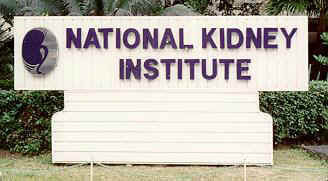
About the DivisionThe National Kidney and Transplant Institute is a 160 bed specialty hospital at present, housed in the suburbs of Quezon City in Metro Manila Philippines. It is composed of 120 private beds and 40 service or charity beds. The NKTI is the foremost referral center of all types of Nephrologic and Urologic diseases. Even with this seemingly myopic focus on Nephrology and Urology, the NKTI also has some aspects usually seen only in general hospitals. The NKTI has a very significant internal medicine and general surgery staff each with their own residency training programs. Indeed a very significant percentage of the NKTI's admissions has nothing to do with Nephrology or Urology.
The NKTI Division of Urology was established in 1983 at the same time as the NKTI, formerly known as the National Kidney Foundation of the Philippines, by Drs. Benjamin C. Magsino, Abelardo M. Prodigalidad, and Genaro M. Yusi. Since then, the Division's admissions has grown at an almost exponential rate with a mere 46 patients in 1983 to a whopping 1,127 for 1995. This is also reflected in the number of operative procedures done with only 90 major and minor operations in 1983 compared to 1,642 in 1995. In 1994, the Institute was renamed from the original National Kidney Institute to the National Kidney and Transplant Institute, to reflect the fact that kidneys are not the only organs transplanted here.
Unlike many other institutions in the country, the NKTI Division of Urology has a healthy balance between private and service (aka charity) patients. In addition, the Division has the most number of both active and visiting Urology consultants in the country, thus as far as training purposes are concerned, residents-in-training have to opportunity to see not only many different urology cases, but also the styles peculiar to each consultant. The Division also boasts of having among the most number of Urologic procedures per day, both open and endourological.
The Institute also offers some of the most advanced diagnostic and therapeutic facilities available for Urologists. These include:
- Urodynamic Studies
- Percutaneous Kidney Procedures
- Transrectal Ultrasound of the Prostate with or without Biopsies
- Trans-urethral Endourologyical Procedures including Ureteroscopies, EMI Lithotripsy, Video-Laser Ablation of the Prostate (VLAP), Ultrasonic Lithotripsy.
- Extra-corporeal Shock Wave Lithotripsy (ESWL) - affiliated with Philippine Lithotripter Inc. (PWI).
- Special Surgical Equipment such as Ultrasonic Dissector, Argon Beam Coagulation, Operating Microscopes for Microsurgery.
- Cadaver and Living-Related Kidney Transplantation
- Diagnostic and Interventional Angiography
- Percutaneous procedures under Ultrasonic or Flouroscopic Guidance in the kidney or other organs like Percutaneous Nephrolithotomies or Nephrostomies, renal biopsies or percutaneous renal cyst aspirations.
- Radionuclide Imaging Studies such as bone or renal scans
- Color Doppler Imaging for vascular involvement of renal tumors or vascular defects
- Advanced Immunological Studies
In the middle of 1998 however a crisis occured which threatened the Institute's existence. A fire broke out in the adjacent Lung Center of the Philippines which engulfed portions of the NKTI, namely part of the Radiology Department and Unit 7, the largest charity ward in the hospital. Because of this, the number of beds has decreased significantly from its original 209 beds with 138 private beds and 71 charity or service beds. There is some hope in the future. Part of the original service beds may be operational early next year and new wings will be added shortly after. Hopefully, this will bring back the Institute's service record back to code or perhaps even exceed it.
[What's New] [About Urology] [About the Division] [Objectives] [Patient Services] [Training Services] [Publications] [Personnel] [NKTIUAA] [Links][Mailing/Chat] [Consultations] [Feedback]
